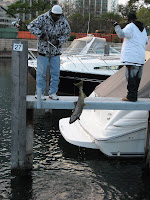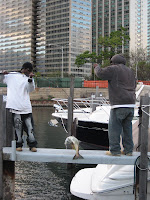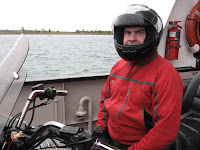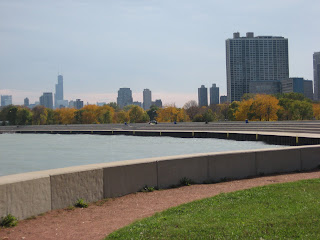
For the last few weeks, we have watched Belmont Harbor clear out for the season. It was an especially sad day to see our neighbors aboard the Harbor Dog go; I stood on the dock and waved as Steve and Cindy cruised off toward dry dock.
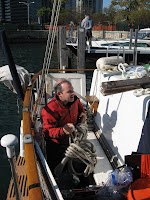 On Sunday it was our turn. We spent a couple hours packing up Lil Choppin, securing the bikes and plants on board, hauling out the winter lines and putting away the summer ones. Mark organized the lazarette with all our gear. We filled the water tanks, pumped out the sewage, and were on our way.
On Sunday it was our turn. We spent a couple hours packing up Lil Choppin, securing the bikes and plants on board, hauling out the winter lines and putting away the summer ones. Mark organized the lazarette with all our gear. We filled the water tanks, pumped out the sewage, and were on our way.We were still a little leery of the lake after it claimed three of us last week.
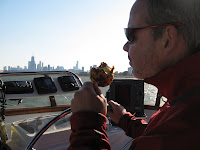 The wind had changed direction, so instead of riding rolling waves, we were tossed about in choppy water from all sides. Still, the ride was surprisingly smooth, the weather warm and sunny, and we ate caramel apples as we cruised south for the winter.
The wind had changed direction, so instead of riding rolling waves, we were tossed about in choppy water from all sides. Still, the ride was surprisingly smooth, the weather warm and sunny, and we ate caramel apples as we cruised south for the winter.We were reticent to leave the trees of Lincoln Park, but we get to trade them in for giants of glass and steel.
 Now, instead of the constant hum of Lake Shore Drive traffic, we have trains and barges. Instead of watching runners gleefully racing outside on the bike path, I watch runners like rats on treadmills in River City Bally’s. I can sit at my home office and listen to the tour boat guides all day. “And to your left, you’ll see River City, which looks just like the corncob of Marina Towers. That’s no coincidence – they were built by the same architect!” And in the South Loop, we are in the midst of the biggest gentrification this city has ever seen: I counted seven cranes on the skyline yesterday, new condos have gone up over the summer, and we are now within walking distance of the newest, biggest, glossiest Whole Foods in the city. There’s even talk of the property just north of us – the beautiful green space that has survived the jackhammers – finally breaking ground for – you guessed it – more condos.
Now, instead of the constant hum of Lake Shore Drive traffic, we have trains and barges. Instead of watching runners gleefully racing outside on the bike path, I watch runners like rats on treadmills in River City Bally’s. I can sit at my home office and listen to the tour boat guides all day. “And to your left, you’ll see River City, which looks just like the corncob of Marina Towers. That’s no coincidence – they were built by the same architect!” And in the South Loop, we are in the midst of the biggest gentrification this city has ever seen: I counted seven cranes on the skyline yesterday, new condos have gone up over the summer, and we are now within walking distance of the newest, biggest, glossiest Whole Foods in the city. There’s even talk of the property just north of us – the beautiful green space that has survived the jackhammers – finally breaking ground for – you guessed it – more condos.Hasn’t the housing market fallen through?
Developments like these make the captain nervous – he fears that one day, the whole river will be developed and there won’t be anywhere for live aboards to spend the winter.
By that time, global warming will be in full effect, and the lake will be hospitable year-round.
